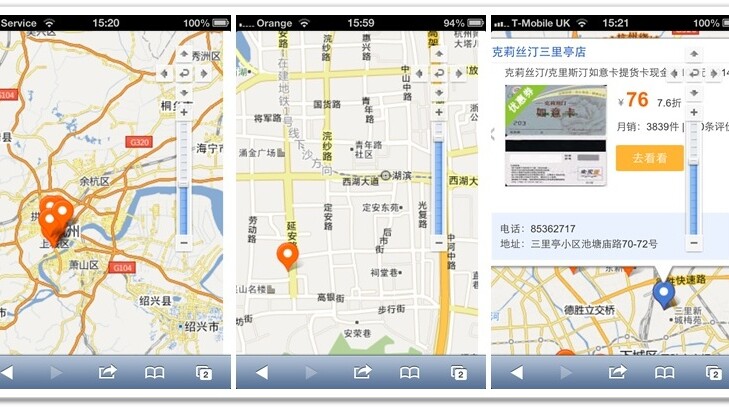
Apple’s decision to ship iOS 6 without Google Maps last month was an opportunity seized upon by Baidu in China almost immediately. Now, following the calm after the #Mapgate storm, a new challenger has entered the market in China, in the form of Alibaba-owned e-commerce giant Taobao.
Parent Alibaba is a verified Internet colossus; it’s set to see in higher sales volume than Amazon and eBay combined this year and is aiming to hit 3 trillion RMB ($474 billion) in sales within five to seven years. Though the company doesn’t disclose exactly how much of that estimate will come from Taobao, CEO Jack Ma did reveal last year projections of 1 trillion RMB ($158 billion) in annual sales for the site. But that, it seems, isn’t enough and the company quietly launched its maps service today, as spotted by Marbridge.
The service, which has had no marketing push whatsoever, is available to users of the Taobao Local Life mobile app, as well as Taobao Travel, and price comparison app Etao Guangjie. The service can also be accessed and used via the Web from map.taobao.com – from our experience, TNW found it rendered better in a mobile browser over a desktop.
As you’d expect from a giant like Taobao/Alibaba, the service includes more than just your standard map and directions. Like Baidu’s latest service, Taobao Maps includes information about local businesses, alongside discounts and services which are displayed within the map.
Marbridge explains that, according to Chinese media reports, AliCloud — another Alibaba owned entity — is providing the mapping with retailer and merchant information taken from the Taobao range of sites. AliCloud is said to have obtained an Internet mapping license, which is mandatory for all map makers, back in 2010.
Taobao is already moving its colossal fortress into new ground — with Hong Kong and Taiwan its first port of call — and it looks very much like the mapping service is made for mobile, indicating that it will take on Baidu, and to a lesser extent Google and Apple, by using its significant e-commerce clout to provide local information. With that mind, we can probably expect plenty of updates, new additions and integrations with other services and products.
Given that the launch is very much a stealth one, we’ve reached out to Alibaba and Taobao to ascertain further details.
Users across most of the world voiced dissatisfaction with the new Apple maps, which have considerably less details, but the changes have been particularly bizarre in China. There, as we reported, the satellite and hybrid views are limited to covering China only while Apple and partner TomTom have taken a unique approach to the Diaoyu Islands.
Initially the islands, which are the subject of a dispute between Japan and China, were left out all together, however that was changed and instead, bizarrely, the maps were included twice. That issue is all the more critical given that Japan’s recent move to buy them has resulted in significant discontent in China, with Japanese firms — including Panasonic — bearing the brunt of, at times violent, protests.
Alibaba restructured its group of business — which includes a number of Taobao entities — in July in a bid to to “drive synergy” between them.
Update: An Alibaba rep tells us that the service will not be standalone and confirms it is being integrated into Taobao services:
“The mapping technology was developed by Aliyun [the division behind Alibaba’s now standalone mobile business] and was actually already available to users through the mobile OS. The technology is being leveraged by Taobao to make available offline service information and deals for its users in a new display format. Users will be able to view locations of offline services (restaurants etc.), Juhuasuan merchants and some Taobao sellers who have brick-and-mortar storefronts.”
Image via Flickr / keso
Get the TNW newsletter
Get the most important tech news in your inbox each week.





